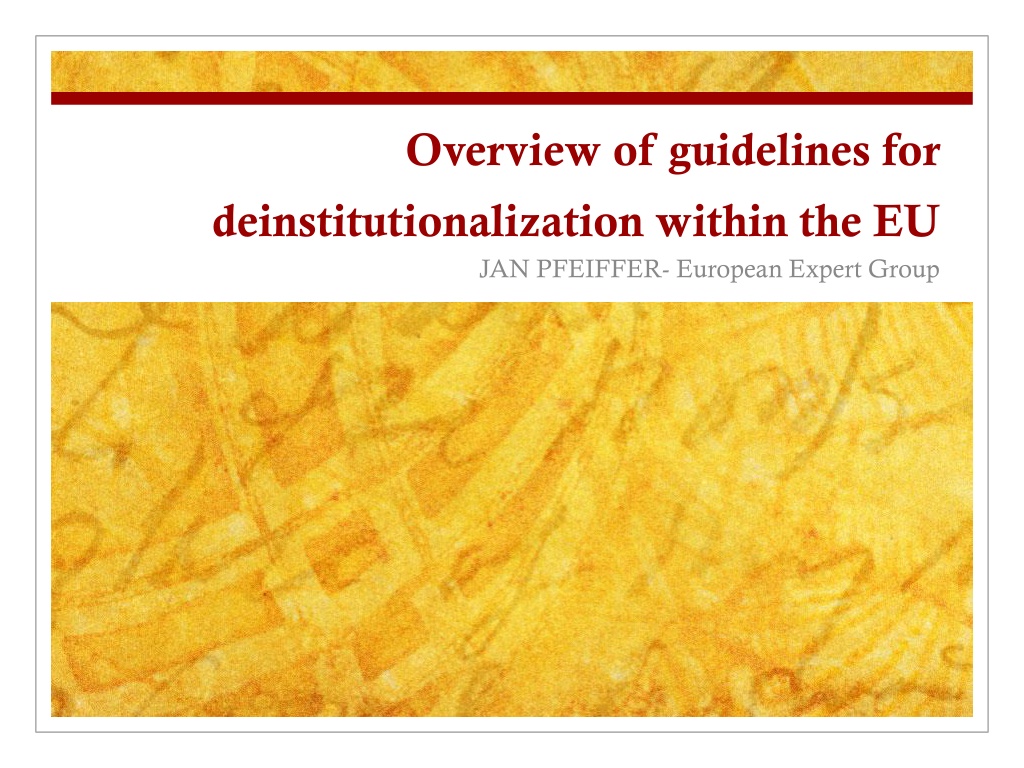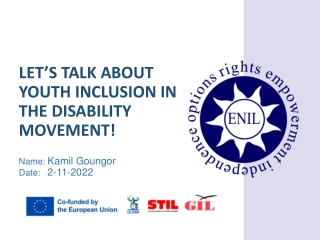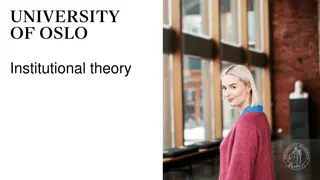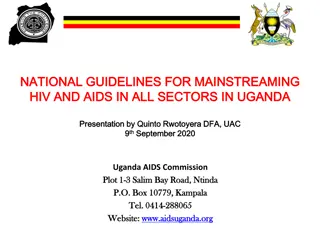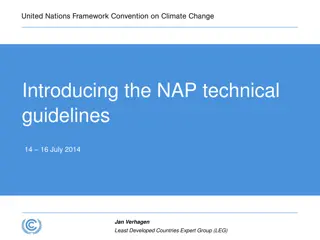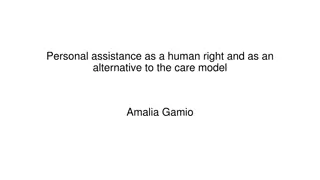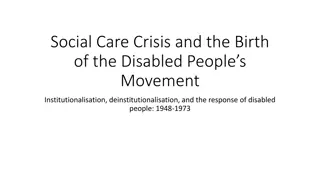Guidelines for Deinstitutionalization in the EU - Overview and Implementation
Guidelines for deinstitutionalization in the European Union emphasize necessary components like legislation, leadership, and service coordination. Humanization and support in the community are key aspects of the process, focusing on transition from an institutional to community-oriented culture. The UN Convention on the Rights of Persons with Disabilities plays a crucial role in promoting rights, inclusion, and independent living. Service components include mental health care, crisis intervention, education, and employment support.
Download Presentation

Please find below an Image/Link to download the presentation.
The content on the website is provided AS IS for your information and personal use only. It may not be sold, licensed, or shared on other websites without obtaining consent from the author. Download presentation by click this link. If you encounter any issues during the download, it is possible that the publisher has removed the file from their server.
E N D
Presentation Transcript
Overview of guidelines for deinstitutionalization within the EU JAN PFEIFFER- European Expert Group
SF ALLOCATION 2007-20013- SF used for DI
NECESSERY COMPONENTS LEGISLATION LEADERSHIP AND COORDINATION OF CHANGE SERVICES Reform L USERS FINANCING QULITI
HUMANIZATION RE NAMING Traps- What is not DI MOVING ONLY A BETTER CLIENTS DEVELOPING MINI INSTITUTIONS CLOSING INSTITUTIONS WITHOU PROPER COMMUNITY SETTINGS COMMUNITI SERVICES WITH INSTITUTIONAL CULTURE
WHAT IS DEINSTITUTIONALIZATION Support in the Community Institutional care
CHANGING A CULTURE Institution oriented To person oriented Isolation from broader community Inclusion in the community Clients are compelled living together Clients has to decide where and whit whom to live Not sufficient control over the live Maximum support of the clients of his control over the life Rigidity of routine Block treatment Normalization principle Support according a needs Paternalistic relationship Partnership between staff and clients Rules of the institution are more important the needs of the clients Team cooperation Flexibility in care provision
UN Convention on the Rights of Persons Disabilities (CRPD). Human rights framewo Art.19: Living independently and being included in the community live in the community- with needed assistance full inclusion and participation accessibility of the services for general public choices equal to others: with whom to live where to live
SERVICES COMPONENTS Mental health care include crisis intervention Assisting in daily living Education General health care Work- employment Social life- leisure Income Individual approach with an ownership of the user Family support Housing
DEVELOP COMMUNITY SERVICES AND STOP ADMISSIONS TO INSTITUTIONAL CARE COMMUNITY SUPPORT FOR PEOPLE ON WAITING LIST DEVELOPING COMMUNITY SERVICES MUNICIPAL ITY
REGIONALIZATION OF INSTITUTIONS
PRINCIPLES OF CARE MAXIMUM USE OF NORMAL COMMUNITI RESOURCES. CHOICE MENTAL HEALTH IN PRIMARY HEALTH CARE REGIONALIZATION CONTINUITI OF CARE ASSERTIVNESS GATE KEEPING
COMMON QUALITY FRAMEWORK PRECONDITIONS FOR SERVICES DELIVERY REQUIREMENTS FOR THE STAFF BENEFITS AND SERVICE RESULTS NEEDS OF PERSON SERVED REQUIREMENTS FOR THE SERVICE REQUIREMENTS FOR THE SERVICE PROVIDER PRECONDITIONS FOR SERVICES DELIVERY
PRINCIPLES (CQS) GOOD GOVERNANCE 1. PARTNERSHIP 2. RIGHTS 3. PARTICIPATION 4. COMPETENCE OF STAFF 5. ETHIC 6. PERSON CENTERED 7. COMPREHESIVNES 8. RESUT ORIENTATION 9.
Developing and monitoring of quality of care Professional development supervision Development Inspection of quality Self monitoring Users Quality Quality standards involvement in monitoring
Reducing Clients-Costs-Staff 100 80 60 Clients Cost Staff 40 20 Staff 0 Cost Year 0Year 2Year 4Year 6 Clients Year 8 Year 10
INCREASING OF COSTS DURING FIRST YERS OF DI TRANSFORMAION
System of moving money from institution to the community care FINANCING Financial motivation for institutional service provider to develop community services FI Money follows the client (personal budget) Allocation according level of needed support Purchasing services on local level Bridging fond
Users involvement and empowering Involvement to decision about service provision Full Participation on National DI Policy involvement to individual plane System of individual budget User Gaining legal capacity
Coordination of DI process MJ,MF,ME, MIA MH MLSW DI WG of NATIONAL CENTRE FOR DI DEVELOPING STRATEGY AND ACTION PLANE PILOT PROJECTS COORDINATION OF IMPLEMENTATION ASSISTING IN IMPLEMENTATION OF COMPLEX DI PROCESS
OBSTACLES MISUNDERSTANDING WHAT IS DI MISSING LEADERSHIP IN STABILITI OF STATE OFFICIALS DOMINATION OF INTERESTS WHICH ARE DIFFERENT THEN INTERST OF CLINTS HIGH CORRUPTION RIGIDITI OF FINANCING CONCEPT OF FULL LEGAL INCAPACITI POOR CLINTS REPREZENTATION
FREQUENT STATEMENTS- QUESTIONS SITUATION IN OLD EU MEMBERSTATES IS DIFFERENT AND IDEA OF DI IS NOT FULLY APLICABLE TO NEW MEMBERSTATES IT IS NOT REALISTIC EVERYBODY CAN BE ICLUDED IN THE COMMUNITI-INSTITUTIONS WILL BE NEEDED. IT IS TO DANGEROUS (FOR OTHERS) ALL PEOPLE WITH MENTAL HEALT PROBLEMS ARE IN THE COMMUNITI. WHERERE TO CLOSE INSTITUTIONS THERE WILL BE HIGH SUICIDE RISK AND HOMELESSNESS. COMMUNITI CARE WILL BE MORE COSTLY. PEOPLE WITH INTELECTUAL DISABILITI AN PSYCHO SOCIAL PROBLEMS CAN NOT DECIDE ON THEIR OWN- THEY NEED TO BE PROTECTECT. PROFESSIONAL KNOW BETTER AN HAVE TO LEADE SERVICES
System of monitoring and quality control Analysis of legislative barriers- changing legislation Development of needed trainings Way forward Searching for additional resources Stop admission to the institutions Prevention of institutionalization Development of community services Effective use of all resources Closure of institutions Holistic coordination Continual awareness
IMPORTAN T TO KNOW WHERE TO GO THANKS FOR ATTENTION AD NO TO STOP WHEN THERE ARE OBSTACLES
